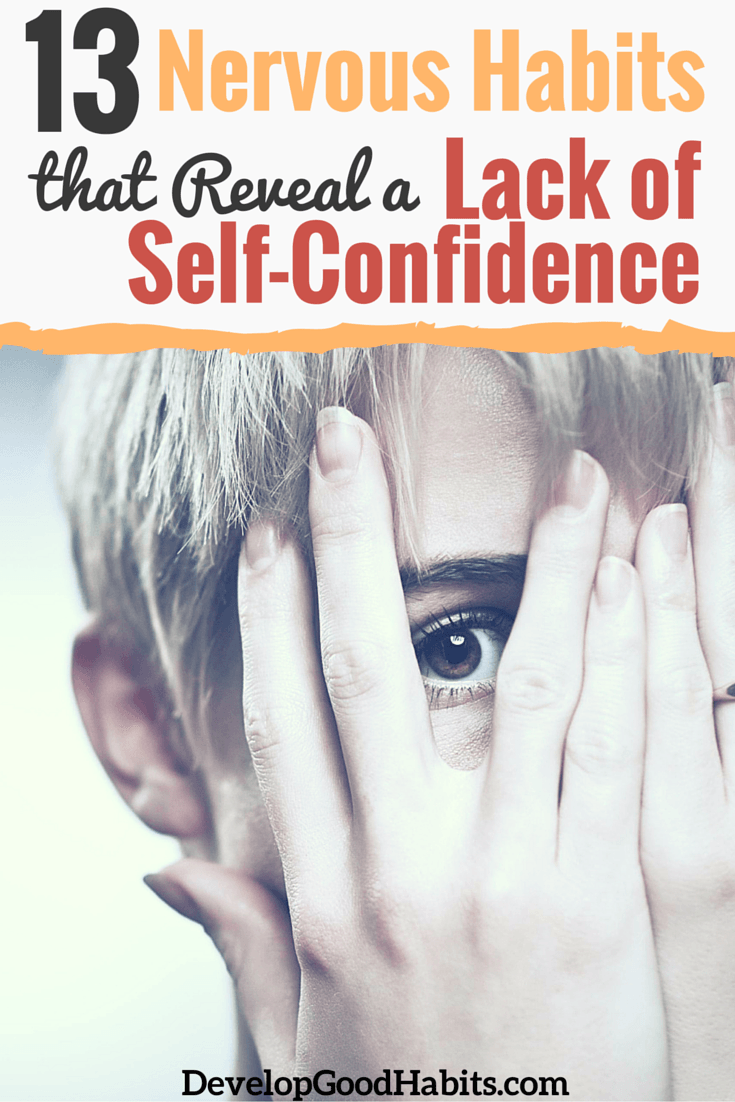Why I Feel Like I Have the Thigh and Back of Leg Like It Stings or Tender
There might be affiliate links on this page, which means we get a small commission of anything you buy. As an Amazon Associate we earn from qualifying purchases. Please do your own research before making any online purchase.
Want to learn how to stop fidgeting in a social setting?
Do you often show these signs of nervous habits like:
- Leg shaking
- Taping fingers
- Ear touching obsession
- Touching hair
- Fidgety fingers
- Biting your nails
If you display any sign of these anxiety habits, then check out the following list discover your nervous tics and learn a few simple ways to overcome them.
Most of these common nervous habits are either caused or exacerbated by stress. We're going to talk about stress management to help in breaking these nervous habits and make you feel more confident in social settings.
(Side note: Another positive way to improve your life is to read and learn something new every day. A great tool to do this is to join over 1 million others and start your day with the latest FREE, informative news from this website.)
What You Will Learn
- 13 Nervous Habits or Tics
- 1. Biting Your Fingernails
- 2. Avoiding Eye Contact
- 3. Smoking
- 4. Grinding and Clenching Your Teeth
- 5. Rushed Speech
- 6. Sucking and Chewing on Pens or Pencils
- 7. Tapping Your Foot
- 8. Twirling and Touching Your Hair
- 9. Cracking Your Knuckles
- 10. Touching Your Face
- 11. Fidgety Fingers
- 12. Biting Your Lower Lip
- 13. Laughing or Giggling
- Dealing with your Nervous Habits
13 Nervous Habits or Tics
1. Biting Your Fingernails
One of the most common nervous habits is biting your nails. You might not even realize that you do this because once it's a habit, it will become repetitive and involuntary.
Although it might seem like a self-soothing behavior, it does nothing but cause ragged-looking nails which are susceptible to inflammation and paronychia.
Biting your nails may be an extension of thumb-sucking or even a learned behavior from other family members.
Some ways you can curb this bad nervous habit are to:
- Keep hands clean and covered with gloves when possible.
- Coat nails with an unpleasant-tasting substance in order to deter you from biting them. This makes the nail bitter and unpleasant to taste but is 100% safe for children and adults of all ages. The most popular product on the market is Mavala Stop!
- Get a manicure regularly or cover your nails with polish to help your nails grow and encourage you to keep your nails looking healthy.
- Reward yourself when you don't bite your nails for a certain period of time.
RELATED: Habits that Stick!
Want to build a new habit that will stick for the rest of your lifetime? In this video, you will discover a simple 9-step process about building habits that you can immediately implement.
2. Avoiding Eye Contact
Glancing down and looking away from people you're talking to may be perceived as a lack of confidence, disrespect or rudeness. Eye contact is a sign of respect (in the west, at least).
If you're anxious about making eye contact in social settings, here are some things that may help:
- Instead of looking directly into someone's eyes, look at the top of the person's cheekbone, nose or their lips. They won't even be able to tell that you're not making eye contact because you're still looking at their face.
- When shaking hands and meeting someone for the first time, try to make eye contact. It's only for a few seconds and there is no harm in testing this out with a stranger; you have nothing to lose.
- Keep your phone away from you when conversing with someone so that it forces you to look up, be present and stay involved with the conversation.
- Try to remind yourself to avoid looking down or away for long periods of time.
3. Smoking
Some people light a cigarette when they feel nervous but, as we are all aware of by now, nicotine is an addictive stimulant that actually makes you more nervous. Most smokers feed their bad habit by associating smoking to their breaks from work, which are the only times they can smoke and get away from stressful situations at the same time.
The problem is, this is only a short-term solution to stress. In order to kick your bad smoking habit, maybe it's time to finally seek some professional help. Try getting hypnotized, pills, nicotine gum, vapor cigarettes or e-cigarettes. Once you've kicked the habit, or reduced your smoking, it's time to start working on finding another outlet for your stress.
Smoking is also one of the classic "bad habits" that people try to break. If you want to take another shot at getting rid of this habit (I know it isn't easy) why not take a look at some strategies for changing bad habits.

4. Grinding and Clenching Your Teeth
Some people, when nervous will experience bruxism, which is a condition in which you repetitively clench and grind your teeth.
This can happen while you sleep, or while you're awake. Sleep bruxism usually only lasts for 30 seconds or less but can still have long-term complications.
Over time, if you continue to grind your teeth, it can result in worn-down, loose teeth, cracks, broken fillings, gum recession and headaches (which will actually make your stress worse).
Next time, when you notice yourself grinding your teeth, stop and take some deep breaths instead, and be aware of your facial muscles and surroundings. Stress and anxiety can trigger and exaggerate teeth grinding.
For nocturnal bruxism, seek help from your dentist who can do a bruxism evaluation and who can recommend a bruxism appliance you can wear at night. Another way to avoid grinding and clenching your teeth is to avoid drinking too much alcohol and avoid chewing gum; both are said to worsen the condition.
5. Rushed Speech
Another nervous habit that you may have experienced at one point or another is rushed speech. This can be harmful because talking really fast may paint you as the stereotypical salesperson.
Another harmful effect is that people won't understand you because you lose your enunciation when you talk too quickly. When speaking quickly, you may also disturb the flow of conversations because people will ask you to slow down or repeat what you just said. This could lead to frustration among the group.
If you experience rushed speech from time to time, here are some ways to help:
- If you're nervous, take a few deep breaths before answering a question or starting a presentation.
- Practice what you have to say. Record yourself talking and listen. Make sure you are speaking slowly and enunciating every word.
- If you need to talk fast to cover your topic in the appropriate amount of time, cut down your speech or notes.
- Put some "Slow down!" reminders on your notes or cue cards.
- If you know you have this nervous habit, why not set a reminder on your phone to go off every minute (on vibrate), which will help to remind you to slow down during conversations.
6. Sucking and Chewing on Pens or Pencils
This is another bad habit that may have started in your early childhood and may be hard to break when you're an adult.
Pen and pencil chewing and sucking may seem harmless but there are reasons why you need to learn how to curb this bad habit. It's unhygienic:

If you are used to grabbing a pen and putting it in your mouth, you may, one day grab someone else's pen (and you don't know where that's been). Always remember that germs quickly spread from hands to mouths.
This bad habit is one that not only harms your teeth but also your reputation in the long run. You don't want to be known as the person in the office that you can't let borrow a pen.
Here are some ways to help you break this nervous habit:
- Try using your keyboard or your phone to take notes instead of pens/pencils.
- Choose to use pens with ends that are hard to chew, or pencils with big erasers.
- Coat the ends with a bitter substance, cover it with tape, or cover it with something furry.
- Keep healthy bite-sized snacks (carrots or celery sticks) near you.
- Instead of chewing on your pen, eat something else to curb your oral fixation.
7. Tapping Your Foot
Tapping your foot is another nervous habit that can be caused by stress. This habit can be seen as a sign of irritation or impatience and may be annoying to others.
If you are trying to break this habit, if you have the option to stand up or remain standing during a conversation or presentation then choose to stand so that you won't be tempted to tap your foot.
Another way to help you to stop tapping your foot is: when sitting, plant both of your feet firmly on the ground and check on them occasionally. If you have the urge to tap, hold your palms over your legs or try crossing your legs.
8. Twirling and Touching Your Hair
Playing with your hair isn't always a sign of flirting, it can be known as a nervous habit and a self-soothing behavior. In some cases, hair pulling becomes so severe and can cause trichotillomania, which is the urge to constantly pull hair until it breaks.
Other types of hair playing, more common with women are: tucking hair behind the ears, twirling the hair and smoothing it down or patting the hair. If hair playing is getting a little obsessive and repetitive, it could be a sign of anxiety, stress or discomfort.
If you're not sure if you have to be concerned, try being aware of the habit and count how many times you touch your hair during stressful situations (meetings, presentations, etc.). If you notice it's a problem, keep track and reward yourself every time your number reduces. For severe cases, seek professional help in the areas of stress management or anxiety.
9. Cracking Your Knuckles
This is a very common nervous habit used to relieve stress but there are downsides to cracking your knuckles. First of all, it can be very annoying to your family, friends, and coworkers. It can also have long-term effects like lower grip strength if you are cracking your knuckles too often.
Here are some ways to help your knuckles stay healthy:
- Count how many times you crack your knuckles. Set up a reward system for when your knuckle cracking reduces in frequency.
- Keep your hands busy or take up a new hobby.
- When idle, wrap your hands to remind yourself not to crack your knuckles.
- Hold a pen or pencil during stressful situations.
- Remind yourself of the long-term damage that you may cause.
10. Touching Your Face
Another unhygienic nervous habit is face touching. Face touching may be seen as a self-pacifying gesture when a person is insecure or hiding something. When people get nervous, sometimes they will feel a need to scratch parts of their face.
If you have problems with this nervous habit, remember, before any meeting or presentation to check yourself in the mirror and assure yourself that nothing is wrong with your face and remind yourself that you won't have a need to scratch or touch your face.
You can also try holding a pen or do something to keep your hands busy. Another way to curb this habit is to remind yourself that your hands are not clean all of the time and you may be spreading germs from your mouth, back to your hands, and then onto other people.
For worse cases (including chronic acne pickers), trim your fingernails regularly and definitely don't use magnifying mirrors because that will make you want to touch your pimples even more.
11. Fidgety Fingers
This annoying habit involves everything from tapping your fingers on the table and drumming your hands on your legs to playing with your wristwatch or bracelets and playing with the arm of a chair. This might appear to others that you are someone who is unfocused, bored or dealing with anxiety and stress.
Tips to help your fidgety fingers stay still:
- Avoid wearing a wristwatch or bracelets when you're going to an important meeting.
- Keep your table free of items you can play with (pens, rubber bands, paper clips) or designate a place for them and call it your No-Touch zone.
- If you like drumming your fingers, before any important meeting, visualize and imagine your fingers being wrapped with tape or gauze.
12. Biting Your Lower Lip
Biting your lip is extremely common and, like hair playing, is often considered a sign of flirting. If lip-biting becomes excessive it can have harmful effects. It can cause dry, chapped lips, and bleeding lips due to exposure of the lips to the mouth's digestive enzymes.

To help you stop your lip biting, take deep breaths to calm yourself before any important meeting. Another great way that might help reduce lip biting is to use a good quality moisturizing lip balm or petroleum jelly. Try using flavored ones (make sure you're not allergic) and use the taste as a reminder to stop biting your lip.
13. Laughing or Giggling
Laughing or giggling might not seem like a big problem at first, but it can be embarrassing in certain social situations and you might not get taken seriously. Nervous laughter is a physical reaction to anxiety, and in order to stop your giggles, you will need to get help with your anxiety.
Here are some habit tips that you can try:
- Identify what kind of situations set you off. Look for patterns. Is it certain people, sexes, people of authority or certain places?
- Think of situations that you know you won't laugh at. What's the difference? Remember that you're in control and are able to turn off the laughter when you need to.
- When you feel like you're on the verge of laughing or giggling, either dig your fingernails into your palms or focus on the most serious non-laughing matter you can think of.
- Find outlets to release real laughter.
Dealing with your Nervous Habits
Stress-related habits like the ones listed above can be embarrassing, stressful and even harmful for your social life and health. It's important to work on yourself and learn some of the steps above on how to break nervous habits as some of them can have harmful long-term effects.
Once you try the tips we've listed above, and get outside help if needed, you will start to feel more comfortable in your own skin and slowly build up your confidence and feel more at ease in social situations. Confidence breeds confidence, and simply feeling more at ease in social situations will help bolster that confidence in a positive cycle.
Finally, if you want another positive way to improve your life, then read and learn something new every day. A great tool to do this is to join over 1 million others and start your day with the latest FREE, informative news from this website.
Like this post?
Then share the below image on your favorite social media website (like Pinterest)!


Why I Feel Like I Have the Thigh and Back of Leg Like It Stings or Tender
Source: https://www.developgoodhabits.com/nervous-habits/
0 Response to "Why I Feel Like I Have the Thigh and Back of Leg Like It Stings or Tender"
Post a Comment